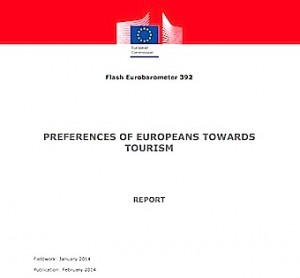If the results of the European Commission’s latest Flash Eurobarometer survey into ‘Preferences of Europeans Towards Tourism’ are accepted as being indicative (the overall base was just 14,627 people across 35 countries who took personal travel for four or more consecutive nights in 2013), 78% of Irish people used the Internet to arrange their holiday in 2013, 20% did so through someone they know, 20% over the phone, 15% over the counter at a travel agency, 7% over the counter of a transportation company, 7% on site (at the holiday destination), and 4% by post. (The 151% total reflects the multiple-answer possibility to the question: “Did you arrange your holiday in 2013 using any of the following methods?”) 
All respondents (31,122 in 35 countries) were also asked: “Of the following information sources, which do you consider to be the most important when you make a decision about your travel plans?” A maximum of three sources could be given. The results for Ireland were:
Recommendations of friends, colleagues or relatives: 67%
Internet websites: 54%
Personal experience: 34%
Travel agencies / Tourism offices: 13%
Free catalogues / brochures: 10%
Newspaper, radio, TV: 10%
Paid-for guidebooks, magazines: 9%
Social media sites: 12%
All respondents were also asked whether the current economic situation had an impact on their holiday plans for 2014. In Ireland almost half (48%) of respondents said that they will still go on holiday but will change their plans, as did almost half in Italy (49%) and over half in Greece (54%). Respondents in the UK (48%), Finland (47%) and Ireland (45%) are the most likely to be planning short-stay trips of up to three consecutive nights.
Other Findings
Other findings of the new Eurobarometer survey included:
* Respondents in Norway (90%), Austria (85%), Iceland (85%), Ireland (85%) and Sweden (85%) travelled the most.
* In 12 countries, at least 50% of the respondents who did not go on holiday in 2013 gave financial reasons as an explanation. This proportion increased significantly in Serbia (66%, +17), Cyprus (69%, +13), Ireland (57%, +9) and Turkey (47%, +9).
* Respondents in Ireland (40%) and Finland (37%) are the most likely to mention the quality of activities or services as a reason to go back to the same place.
* Natural features were least important as a reason for going on holiday in Turkey (14%), Ireland (15%), Portugal (18%) and the UK (18%).
* At national level, the recommendations of friends, colleagues or relatives are the most important sources of information for respondents in 25 countries, in particular Latvia (72%), Ireland (67%) and the Czech Republic (66%).
* Use of the Internet was especially widespread in Norway (80%), Ireland (78%) and Denmark (77%).
* People in Norway (69%), Denmark (65%), and Ireland (62%) are the most likely to have gone on at least one holiday where the various tourism services were purchased separately.
* The top five holiday destinations remain unchanged since last year: Spain (15%, +5), France (11%, +3), Italy (10%, +2), Germany (7%, +2) and Austria (6%, +2).
* In 15 countries, at least nine in 10 people were satisfied with the quality of activities and services during their main holiday. Respondents in Ireland and Malta (both 94%) were especially satisfied.
* In nine countries, at least nine in 10 people were satisfied with the general level of prices on their main holiday, with the highest levels in Belgium (94%), Ireland (92%), Finland (92%), Slovenia (92%) and the UK (92%).
* In 10 countries, at least 90% of respondents say they were satisfied with the way tourists were welcomed on their main holiday last year. The highest levels of satisfaction were recorded in Ireland (93%), Belgium (92%), Slovenia (92%) and the Former Yugoslav Republic of Macedonia (92%).
EC Statement
The European Commission issued the following statement when publishing the survey results:
Tourism has been one of the strongholds of European economy during the economic crisis, and the positive trend will continue in 2014, with only 11% of Europeans expect not to go away. According to the new Eurobarometer survey published today, the sector has been an engine of domestic demand-driven economic growth in 2013, with more people choosing to spend holidays outside of their own country but within the EU.
In 2013, 38% of Europeans spent their main holiday in another EU country, which is five percentage points more compared to 2012. At the same time, only 42% of people spent their main holiday in their own country, a five percentage points decrease compared to 2012. Furthermore in 2013, only a fifth (19%) took their main holiday outside the 28 countries of the EU, which is a 2% decrease compared to 2012.
The Eurobarometer survey on preferences of Europeans towards tourism also explores motivations and obstacles for Europeans to travel, the main destinations, the information sources used for planning a holiday, how Europeans arranged their holidays in 2013, their satisfaction with the sector and the level of safety experienced at the accommodation and services.
European Commission Vice President Antonio Tajani, Commissioner for Industry and Entrepreneurship, commented on the respondents’ preferences and the survey outlook on holiday-making: “As European Commissioner responsible for tourism, I cannot hide my enthusiasm. The attitudes of Europeans towards travelling published today are a sign of reliable and outstanding performance of the tourism sector, which continues to be the sound economic driver for the EU recovery. Figures speak for themselves, while the preferences and views expressed in the survey show how the industry’s robust and resilient performance is expected to continue in 2014.”
In 2013 70% of Europeans travelled for at least one overnight:
Only 11% of Europeans expect not to go away in 2014 because of the current economic situation. Four in 10 Europeans plan to spend their main holiday in their own country (majority of people in Greece, Croatia, Italy and Bulgaria). Three in 10 people expect their main holiday to be in the EU, and over four in 10 intend to have at least one of their trips in the EU in 2014. A quarter plans travelling to a non-EU country (24%) but only 16% will have their main holiday outside the EU.
Further highlights of the Eurobarometer survey:
- In 2013 70% of Europeans travelled for either personal or professional reasons for at least one overnight. Only looking at the personal travel in 2013, most people went away for four to 13 consecutive nights (57%). To a large extent, this pattern is mirrored by the plans for 2014.
- Europeans prefer sunlight and life on the beach (46%).
- The same percentage of respondents mentions the natural features of a given place as the main reason why they would plan to return to the same tourism destination.
- The top five EU holiday destinations remain unchanged since 2012. Spain (15%, +5), France (11%, +3), Italy (10%, +2), Germany (7%, +2) and Austria (6%, +2) continue to be the most popular holiday destinations, all of which have witnessed an increase since 2012. Respondents in Greece, Croatia, Italy and Bulgaria are the most likely to take a holiday in their own country, while respondents in Luxembourg and Belgium are most likely to travel to another country in the EU. Respondents’ plans for 2014 closely resemble those of 2013.
- Tourists in Europe feel safe and very satisfied. Respondents express a high level of satisfaction with most aspects of their 2013 holiday. A majority of respondents were satisfied with the safety (95%) and the quality (95%) of their accommodation.
Little impact of the current economic situation, but financial reasons matter:
No substantial changes will be made to holiday plans as a result of the current economic situation. The survey also looks at what could influence holiday plans. More than half of respondents who did not go on holiday in 2013 say it was at least partially for financial reasons, and 44% considered it was the main reason. Only 11% of respondents expect not to go away in 2014 because of the current economic situation. More importantly, over four in 10 people say they will not change their 2014 holiday plans, while a third say they will change their plans but still travel. The proportion of people who intend to go on holiday without changing their plans for economic reasons ranges from 75% in Austria to 10% in Greece.
The positive trend is supported by the official statistics. According to Eurostat, the tourism sector had record figures in 2013. The total of nights spent in tourist accommodation establishments in all 28 EU Member States increased in 2013 by 1,6% to a record of 2.6 billion nights spent compared to 2012.
The Eurobarometer survey:
This Eurobarometer survey was carried out between 6th and 11th January 2014 on 31,122 respondents from different social and demographic groups, who were interviewed via telephone (landline and mobile phone) in their mother tongue in the EU28 Member States, as well as in other seven countries outside the EU, namely Turkey, the Former Yugoslav Republic of Macedonia, Iceland, Norway, Serbia, Montenegro and Israel.
This wave is a follow-up to Flash Eurobarometer no. 370, conducted in January 2013. The survey was carried out by TNS Political and Social.




